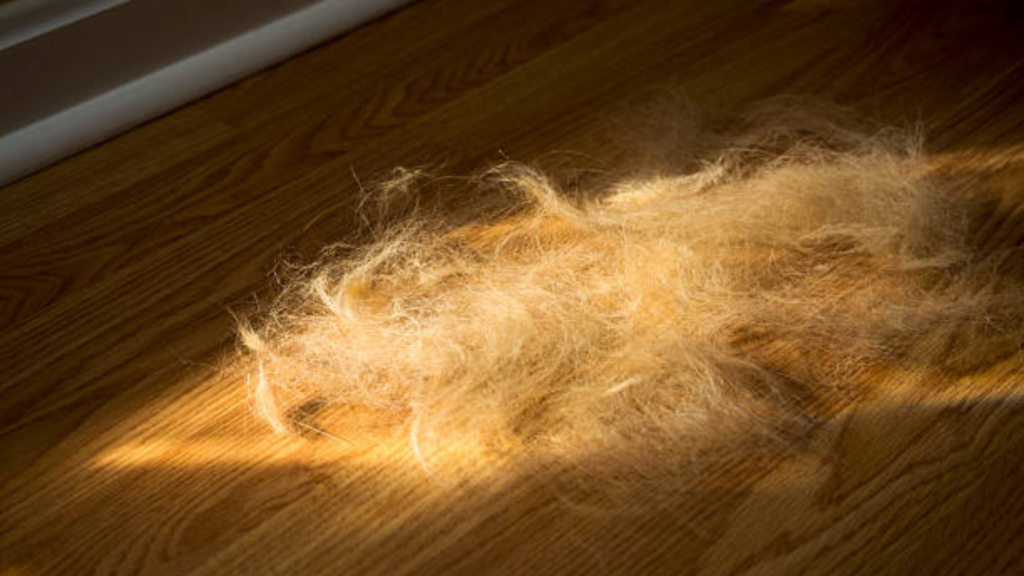We're an affiliate
We hope you love the products we recommend! Just so you know, we may collect a share of sales or other compensation from the links on this page at no additional cost to you. Thank you if you use our links, we really appreciate it!
No, Golden Retrievers are definitely not hypoallergenic! In fact, Golden Retrievers shed from a moderate to an excessive amount of fur depending on the dog and season.
Goldies are one of the most majestic dogs to look at, all thanks to their thick fur coat. They are known to have a double-layered fur coat – a coarse top coat and a soft undercoat.
But as captivating as they may seem, those heavy layers of hair may bring out allergic reactions in some people.
To know more about how Golden Retrievers cause allergies, what hypoallergenic dogs are, and tips to reduce the occurrence of allergic reactions then just keep on reading this post.
What is a Hypoallergenic Dog? Do They Have Different Fur?
Dogs having a fur-type coat, like Golden Retrievers, shed a lot more because of their short fur length that cannot withhold dander for longer periods as compared to hair-coated dogs with longer hair lengths that can hold dander for longer periods and seldomly shed.

Hair-coated dogs are often referred to as “Hypoallergenic” dogs in popular terminology. Even though these so-called “hypoallergenic” dogs are often believed to be less likely to trigger allergic reactions, they are not completely exempt from causing allergies.
No dog is truly and absolutely hypoallergenic, they just shed a minimal amount of dander and dried saliva on their fur every so often which helps lessen the trigger of allergic reactions.
Unlike hypoallergenic dogs, Golden Retrievers leave a lot of strands of fur and dander on places such as pieces of furniture, clothing, and the floor.
Are Golden Retrievers Bad for Allergies?
Definitely! Regardless of the type of Golden Retrievers, they have medium to long fur coats that shed regularly in moderate amounts throughout the year.Constant exposure to these potential allergens may worsen one’s allergies or may trigger other allergic reactions in some people.
It is expected for Golden Retrievers to shed excessively during warmer seasons to adapt to the changes in the climate.
But they may shed a little too excessively due to certain factors such as having insufficient diet, poor coat management, and underlying health conditions.
Now as a prospective owner with existing allergies, having a Golden Retriever may not be a suitable choice for a pet given your existing health condition.
Do Golden Retrievers Cause Allergies?
Certainly! These dogs produce multiple allergens that trigger allergic reactions. The proteins found in a dog’s dead skin cells called “dander” often seen as a flaky substance are usually the culprit for the allergic reactions and not the dog’s fur.

Apart from dander, the dried saliva on its fur may also cause allergies. Signs of allergic reactions may include constant sneezing, wheezing, swollen nasal airways making it difficult to breathe, and skin allergies as well.
In some cases, the dog itself may not be the main cause of one’s allergies but the carrier instead. Golden Retrievers love to roam around, soaking their paws in wet surfaces, and even rubbing themselves in grass or mud. It is then possible that the dust and pollen stored in a dog’s fur may cause an allergic reaction.
Do Allergies Increase with Golden Retriever Age? (Puppies vs Adults)
Most puppies, including Golden Retrievers, start to transition from puppy coats to adult coats as early as 6 months of age.
Puppy coats also trigger allergies just like adult fur. However, adults shed more often due to their substantial shedding – which denotes moderate fur shedding in healthy dogs.
As they age, they also undergo certain health conditions that may affect their shedding cycle like during mating season which causes hormonal imbalances leading to excessive fur loss.
Play bites with other dogs during play dates can cause pollen and dried saliva to get trapped in the dog’s fur coat.
Therefore, there is a high possibility that as a Golden Retriever ages, pet allergies may increase as more allergens can build up in their fur coats.
How To Test If You’re Allergic To Golden Retrievers?
One of the ways to test allergies is through skin test exposure. If you think you are allergic to Golden Retrievers it is best to consult a doctor and conduct an allergy screening test.
It is not always the dog that causes the allergies but the pollen, dander, or mold that are trapped in the dog’s fur that causes allergic reactions.
How Do I Get Rid of My Golden Retriever Allergies? (Tips to Reduce/Get Rid of Allergies)
If it has been ruled out that the cause of your allergies is pollen and dander from your Golden Retriever’s fur, the best course of action is to avoid exposure.
If possible, do not touch or go near dogs with fur coats or go to places with dogs at all. It is also best to take allergy medicines such as antihistamines and steroids.
These medications help lessen the signs of irritation and inflammation brought by allergic reactions.

Regular grooming and fur brushing help prevent the fur from matting and clumping. In this manner, less dander will float and adhere to different surfaces at your home.
Also, as a person with allergies, it is best for you to not do the brushing yourself but instead by a professional groomer.
Frequently Asked Questions
1. I’m Allergic to My Dog Suddenly, Why?
Your sudden allergies may not be caused mainly by your dog. There are a lot of triggering factors in the environment that may cause allergic reactions in our bodies.
An allergen may have been trapped in your dog’s fur coat as it went outside and is transported back into your home which might have triggered an allergic reaction to you all of a sudden.
2. Can You Build Up an Immunity to Dog Allergies?
Immunity to allergies is still an ongoing investigation for researchers. However, immunotherapy is one way to desensitize the immune system whenever exposed to a certain allergen by gradually increasing the exposure of the allergen in the body.
With that being said, one can try consistent exposure to dogs to enhance the immune system’s reaction to allergens.
3. Do Golden Retrievers shed a lot?
Yes, they do! Golden Retrievers are expected to shed excessively during warmer seasons to adapt to the changes in the climate. Golden Retrievers have fur coats rather than hair coats that are shorter and finer in texture which result in consistent shedding compared to hair-coated dogs.
4. Are Golden Retrievers bad for asthma?
If Golden Retrievers are the main triggering factor of your asthma then yes, they are bad for asthma. But you must also consider the specific allergen that causes and triggers your asthma.
Whether it is the dander or pollen transported via the dog’s fur that results in asthma attacks since it differs from person to person.
Conclusion
Golden Retrievers are not hypoallergenic dogs due to their fur morphology and shedding cycle. If you have an existing allergy, then having a Golden Retriever may not be the best option.
Since their fur allows more accumulation of dust and pollen that may cause allergic reactions, they also shed a lot throughout the year.
It is also important to determine the specific cause of your allergies. Dogs may not be the culprit, it is the allergens that are trapped in their coat that cause allergy, they are just merely the carriers.
Although there are certain ways to build up immunity and reduce allergies, it is still best to go with preventive measures rather than treatment procedures and that is to avoid exposure with non-hypoallergenic dogs.

Christine is a Doctor in Veterinary Medicine. As the in-house vet and writer for Furs'n'Paws, Christine shares her extensive knowledge and expertise on all things pet-related, with a particular focus on small animals such as dogs and cats. In addition, she runs her own clinic in the Philippines and volunteers at a local organization to help stray pets. Her commitment to animal health is evident in her writing style, which makes her an invaluable resource for pet owners and animal lovers.



No responses yet